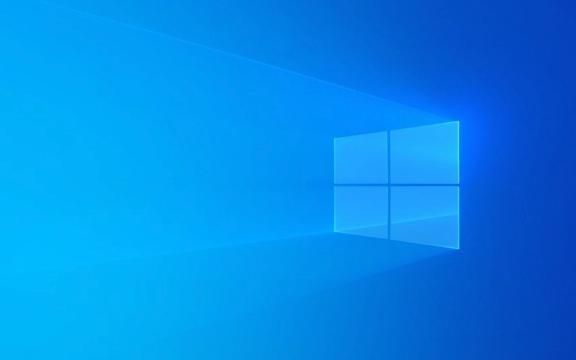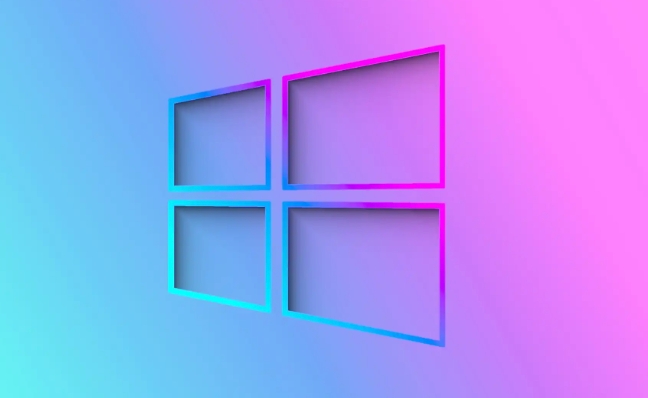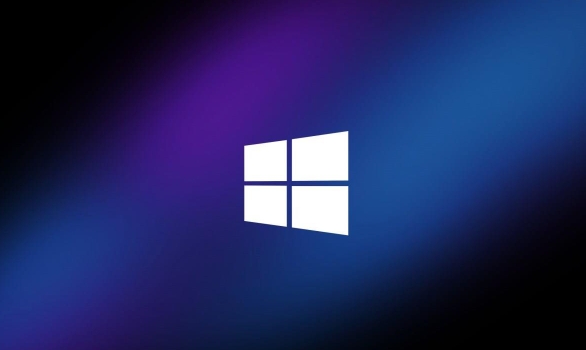Windows 10 Home does not include gpedit.msc, so the "gpedit.msc not found" error is normal and not a system issue. 1. Use Registry Editor (regedit) to manually adjust settings, such as disabling automatic restarts by setting NoAutoRebootWithLoggedOnUsers to 1 under the Windows Update registry path. 2. Install gpedit.msc manually using a trusted third-party batch script from reputable sources like Winaero or The Windows Club, run as administrator, though this method is unofficial and may trigger antivirus warnings. 3. Upgrade to Windows 10 Pro, the only official way to access Group Policy Editor, by entering a Pro product key in Settings > Update & Security > Activation. Additionally, alternative tools like MSCONFIG, PowerShell, and the Settings app can help manage system behavior without gpedit.msc.

If you're using Windows 10 Home and get the error "gpedit.msc not found", you're not doing anything wrong — Group Policy Editor (gpedit.msc) is simply not included in the Home edition of Windows 10. It's only available in Pro, Enterprise, and Education editions.

But don’t worry — there are a few ways to work around this. Here’s how to fix or bypass the "gpedit.msc not found" issue.
? Why gpedit.msc is missing in Windows 10 Home
Microsoft intentionally removes the Local Group Policy Editor (gpedit.msc) from Windows 10 Home to differentiate it from higher-tier editions. This tool is used to manage system policies and settings for users and computers, but most average users don’t need it.

So if you type gpedit.msc in Run (Win R) and get an error, it's expected behavior — not a system problem.
? Solution 1: Use Registry Editor (Regedit) instead
Since you can't use Group Policy on Home edition, many of the same settings can be adjusted manually via the Registry Editor.

?? Warning: Editing the registry can be risky. Always back up the registry before making changes.
Example: Disable Windows Update automatic restart
Instead of using Group Policy, you can set a registry key:
- Press
Win R, typeregedit, and press Enter. - Navigate to:
HKEY_LOCAL_MACHINE\SOFTWARE\Policies\Microsoft\Windows\WindowsUpdate\AU
- Create the key if it doesn’t exist.
- Set a new DWORD value:
- Name:
NoAutoRebootWithLoggedOnUsers - Value:
1
- Name:
This achieves what you'd normally do in Group Policy.
? Tip: Search online for "registry equivalent of [Group Policy setting]" to find workarounds.
? Solution 2: Add gpedit.msc manually (Unofficial method)
You can manually install the Group Policy components on Windows 10 Home using a batch script or third-party tool. This is not officially supported by Microsoft, but it works for many users.
Steps to install gpedit.msc on Windows 10 Home:
-
Download a trusted gpedit installer script
- Search for "add gpedit to Windows 10 Home script" from reputable tech sites (e.g., Winaero, The Windows Club).
- Look for a
.zipfile containing a batch script that copies required files and registersgpedit.msc.
-
Run the script as Administrator
- Extract the zip.
- Right-click the
.batfile → Run as administrator. - Wait for it to finish (it may take a few minutes).
-
Open gpedit.msc
- Press
Win R, typegpedit.msc, and press Enter. - If it opens, the installation succeeded.
- Press
? Note: Antivirus software might flag these scripts as suspicious because they modify system files. Disable AV temporarily if needed (and re-enable after).
? Solution 3: Upgrade to Windows 10 Pro
If you rely heavily on Group Policy (e.g., for work, IT tasks, or advanced customization), the cleanest long-term solution is to upgrade to Windows 10 Pro.
- Go to Settings > Update & Security > Activation
- Click Change product key and enter a Pro license key
- Your system will upgrade, and
gpedit.mscwill be available immediately
This is the only official and supported way to get Group Policy on your PC.
? Bonus: Alternative Tools
If you just need to tweak system settings, consider these tools instead:
- Local Security Policy (secpol.msc) – Also not in Home, but some settings can be adjusted via registry.
- MSCONFIG (System Configuration) – Manage startup and boot options.
- Settings app & Control Panel – Many policies have GUI alternatives.
- PowerShell scripts – Automate changes that would otherwise require Group Policy.
Final Thoughts
The "gpedit.msc not found" error in Windows 10 Home is normal. You have three practical options:
- Use Registry Editor for manual tweaks
- Install gpedit manually via script (with caution)
- Upgrade to Windows 10 Pro for full support
For most home users, editing the registry or using built-in tools is sufficient. Only use third-party scripts if you understand the risks.
Basically, it's not broken — it was never there to begin with.
The above is the detailed content of How to fix gpedit.msc not found in Windows 10 Home. For more information, please follow other related articles on the PHP Chinese website!

Hot AI Tools

Undress AI Tool
Undress images for free

Undresser.AI Undress
AI-powered app for creating realistic nude photos

AI Clothes Remover
Online AI tool for removing clothes from photos.

Clothoff.io
AI clothes remover

Video Face Swap
Swap faces in any video effortlessly with our completely free AI face swap tool!

Hot Article

Hot Tools

Notepad++7.3.1
Easy-to-use and free code editor

SublimeText3 Chinese version
Chinese version, very easy to use

Zend Studio 13.0.1
Powerful PHP integrated development environment

Dreamweaver CS6
Visual web development tools

SublimeText3 Mac version
God-level code editing software (SublimeText3)

Hot Topics
 Windows Security is blank or not showing options
Jul 07, 2025 am 02:40 AM
Windows Security is blank or not showing options
Jul 07, 2025 am 02:40 AM
When the Windows Security Center is blank or the function is missing, you can follow the following steps to check: 1. Confirm whether the system version supports full functions, some functions of the Home Edition are limited, and the Professional Edition and above are more complete; 2. Restart the SecurityHealthService service to ensure that its startup type is set to automatic; 3. Check and uninstall third-party security software that may conflict; 4. Run the sfc/scannow and DISM commands to repair system files; 5. Try to reset or reinstall the Windows Security Center application, and contact Microsoft support if necessary.
 PEAK Voice Chat Not Working on PC: Check This Stepwise Guide!
Jul 03, 2025 pm 06:02 PM
PEAK Voice Chat Not Working on PC: Check This Stepwise Guide!
Jul 03, 2025 pm 06:02 PM
Players have been experiencing the PEAK voice chat not working issue on PC, impacting their cooperation during climbs. If you are in the same situation, you can read this post from MiniTool to learn how to resolve PEAK voice chat issues.Quick Navigat
 Windows stuck on 'undoing changes made to your computer'
Jul 05, 2025 am 02:51 AM
Windows stuck on 'undoing changes made to your computer'
Jul 05, 2025 am 02:51 AM
The computer is stuck in the "Undo Changes made to the computer" interface, which is a common problem after the Windows update fails. It is usually caused by the stuck rollback process and cannot enter the system normally. 1. First of all, you should wait patiently for a long enough time, especially after restarting, it may take more than 30 minutes to complete the rollback, and observe the hard disk light to determine whether it is still running. 2. If there is no progress for a long time, you can force shut down and enter the recovery environment (WinRE) multiple times, and try to start repair or system restore. 3. After entering safe mode, you can uninstall the most recent update records through the control panel. 4. Use the command prompt to execute the bootrec command in the recovery environment to repair the boot file, or run sfc/scannow to check the system file. 5. The last method is to use the "Reset this computer" function
 Proven Ways for Microsoft Teams Error 657rx in Windows 11/10
Jul 07, 2025 pm 12:25 PM
Proven Ways for Microsoft Teams Error 657rx in Windows 11/10
Jul 07, 2025 pm 12:25 PM
Encountering something went wrong 657rx can be frustrating when you log in to Microsoft Teams or Outlook. In this article on MiniTool, we will explore how to fix the Outlook/Microsoft Teams error 657rx so you can get your workflow back on track.Quick
 The RPC server is unavailable Windows
Jul 06, 2025 am 12:07 AM
The RPC server is unavailable Windows
Jul 06, 2025 am 12:07 AM
When encountering the "RPCserverisunavailable" problem, first confirm whether it is a local service exception or a network configuration problem. 1. Check and start the RPC service to ensure that its startup type is automatic. If it cannot be started, check the event log; 2. Check the network connection and firewall settings, test the firewall to turn off the firewall, check DNS resolution and network connectivity; 3. Run the sfc/scannow and DISM commands to repair the system files; 4. Check the group policy and domain controller status in the domain environment, and contact the IT department to assist in the processing. Gradually check it in sequence to locate and solve the problem.
 The requested operation requires elevation Windows
Jul 04, 2025 am 02:58 AM
The requested operation requires elevation Windows
Jul 04, 2025 am 02:58 AM
When you encounter the prompt "This operation requires escalation of permissions", it means that you need administrator permissions to continue. Solutions include: 1. Right-click the "Run as Administrator" program or set the shortcut to always run as an administrator; 2. Check whether the current account is an administrator account, if not, switch or request administrator assistance; 3. Use administrator permissions to open a command prompt or PowerShell to execute relevant commands; 4. Bypass the restrictions by obtaining file ownership or modifying the registry when necessary, but such operations need to be cautious and fully understand the risks. Confirm permission identity and try the above methods usually solve the problem.
 the default gateway is not available Windows
Jul 08, 2025 am 02:21 AM
the default gateway is not available Windows
Jul 08, 2025 am 02:21 AM
When you encounter the "DefaultGatewayisNotAvailable" prompt, it means that the computer cannot connect to the router or does not obtain the network address correctly. 1. First, restart the router and computer, wait for the router to fully start before trying to connect; 2. Check whether the IP address is set to automatically obtain, enter the network attribute to ensure that "Automatically obtain IP address" and "Automatically obtain DNS server address" are selected; 3. Run ipconfig/release and ipconfig/renew through the command prompt to release and re-acquire the IP address, and execute the netsh command to reset the network components if necessary; 4. Check the wireless network card driver, update or reinstall the driver to ensure that it works normally.
 How to fix 'SYSTEM_SERVICE_EXCEPTION' stop code in Windows
Jul 09, 2025 am 02:56 AM
How to fix 'SYSTEM_SERVICE_EXCEPTION' stop code in Windows
Jul 09, 2025 am 02:56 AM
When encountering the "SYSTEM_SERVICE_EXCEPTION" blue screen error, you do not need to reinstall the system or replace the hardware immediately. You can follow the following steps to check: 1. Update or roll back hardware drivers such as graphics cards, especially recently updated drivers; 2. Uninstall third-party antivirus software or system tools, and use WindowsDefender or well-known brand products to replace them; 3. Run sfc/scannow and DISM commands as administrator to repair system files; 4. Check memory problems, restore the default frequency and re-plug and unplug the memory stick, and use Windows memory diagnostic tools to detect. In most cases, the driver and software problems can be solved first.






